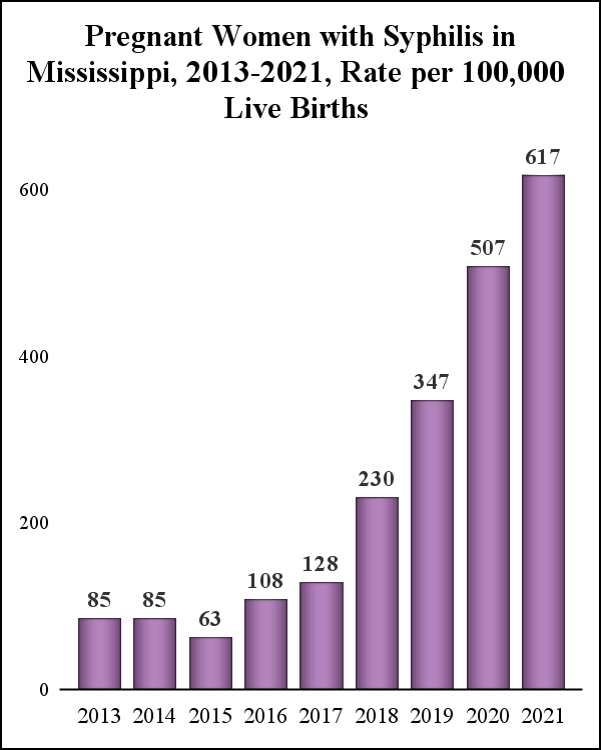State sees dramatic increase in congenital syphilis cases

Congenital syphilis, or infection of a baby from a mother infected with syphilis, is dramatically increasing in Mississippi, according to state data.
“Mississippi is experiencing a frightening increase in pregnant women with syphilis and in turn, babies born with syphilis,” said Dr. Thomas Dobbs, dean of the John D. Bower School of Population Health at UMMC. “This is a devastating condition that leads to miscarriage, stillbirth or death about 40 percent of the time if the mother contracts syphilis during pregnancy, depending on the stage of maternal illness. Mississippi has experienced an increase of greater than 900 percent of babies born with syphilis in the past six years.”

Congenital syphilis can also result in premature birth.
The most recent full year of data is 2021, he said, “so I think it could be an even greater increase.”
Nationally, the rate of syphilis has increased by 147 percent since 2016.
Syphilis is easily cured with penicillin, and thus protecting the baby as well as the mother, he said, noting that the price of penicillin can be a barrier to care. A bacterial disease that usually spreads by sexual contact, syphilis symptoms begin with a sore. Syphilis bacteria can remain inactive in the body for years before becoming active again. Untreated syphilis can result in life-threatening damage to the heart, brain and other organs.

Syphilis can be passed to unborn children through the placenta or during birth. Most babies with congenital syphilis have no symptoms, but some children have a rash that may appear on the soles of their feet and the palms of their hands which can peel later, or present with pneumonia or blood disorders. Later, the syphilis symptoms of blindness, deafness, seizures and neurodevelopmental delays, teeth and skeletal deformities and the collapse of the bridge of the nose are found.
“Several newborns have died recently due to this entirely preventable problem,” Dobbs said. Other children have been diagnosed with severe neurological development disorders because of untreated syphilis.

“This is so tragic because this is preventable,” said Dr. Charlotte Hobbs, professor of pediatric infectious diseases. “Penicillin was the first antibiotic synthesized. If mothers receive adequate treatment, the risk of congenital syphilis drops dramatically.”
Several factors are driving the rising rate of congenital syphilis in Mississippi, Dobbs said.
“Delayed prenatal care and testing is the primary operational reason that women are not getting treatment, followed by delays in accessing antibiotics,” he said. “To combat this public health crisis, our priority must be to engage moms early in pregnancy and ensure testing and treatment. This will require a committed partnership between physicians and clinics, public health, and insurers, primarily Medicaid.”
Mississippi has the second highest rate of syphilis in the country. About 53 percent of congenital syphilis is reported from southern states, according to data from the U.S. Centers for Disease Control and Prevention.
“Many mothers don’t understand that syphilis can kill,” Hobbs said. “Penicillin treatment of infected mothers has 98 percent efficacy in preventing congenital syphilis. Despite evidence-based prevention, congenital syphilis cases nationwide are at a 20-year high.”
The key to addressing this crisis, the doctors say, is early prenatal care, which improves maternal-infant health, reduces infant mortality and saves money.
“Structural barriers, primarily the lack of insurance and maternal care deserts, limit access to early maternal care,” Dobbs said. “From my discussions with physicians across the state, uninsured pregnant women must pay for care out-of-pocket prior to Medicaid approval. Although Medicaid will reimburse retroactively, most clinics require either payment or proof of insurance. This costly delay often puts women well beyond the first trimester before receiving care.”
Testing pregnant women for syphilis would also help mothers get the care needed to prevent the spread of syphilis to their babies, he said.


